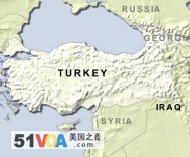Istanbul
03 April 2009
 |
| Turkey, Iraq |
The visit of President Barack Obama is being seen in Turkey as critically important to rebuilding bilateral relations. The U.S. invasion of Iraq not only strained ties between the two countries but also according to observers fueled public anger towards the United States. Last year an opinion poll found that anti-Americanism in Turkey was amongst the highest in the world, even greater than in some Middle Eastern countries.
Deputy Editor of the Turkish daily Taraf, Yasmin Congar, says the decision by President Obama to visit Turkey is crucial to help ease public antipathy. "It is both symbolic and concrete...it will have a big impact on the people to see that there is a new U.S. administration which is more willing to talk to friend and foe, to be open to others ideas and not to act alone,. This is very, very important this feeling of anti American almost hatred against anything American can really paralyze the turkish government in its talks and relations with Washington . This has to be changed," he said.
Opinion polls indicate the election of President Obama has been viewed positively by many Turks. His reaching out to Iranians in a video address last month was warmly received in the Turkish media. On the streets of Istanbul the Obama visit to Turkey is being welcomed. "It is nice they started a good relationship with Iran and they policy in Iraq I hope more based on humanity, The rest, he is a visitor welcome," said one person
Another person interviewed in Istanbul shares those sentiments but has concerns over what the U.S. president may want from Turkey. "He seems to be better than Bush . But, I think he is going to talk about sending of Turkish troops to Afghanistan and I don't feel so good about that because I feel that Turkish troops are being used by some capitalist countries which is not good for me."
Turkey currently has a force of around 900 non-combat forces in the Afghan capital Kabul. But Washington has been pressing Ankara along with other NATO members to send combat troops to Afghanistan.
The chiefs of the Turkish armed forces and government officials are mindful that public opinion is unenthusiastic. Observers say Mr. Obama may receive a commitment to send more Turkish soldiers to help in training of Afghan forces, a role it is already engaged in.
One point of tension that may emerge during Mr. Obama's visit could be continuing effort in the U.S. Congress to label the 1915 mass killings by Ottoman forces of Turkey's Armenian minority as a genocide.
Ankara rejects that label and disputes the death toll saying the killing occurred in a civil war.
Mr. Obama said during his election campaign he would recognize the killings as a genocide. A commitment that if made would probably occur on April 24th when Armenians commemorate the killings. U.S. presidents traditionally make a speech to mark the event.
International relations expert Soli Ozel of Bilgi University says the controversy will be most difficult part of Obama's trip. "Turkey will want iron clad assurances that neither the resolution will pass nor will the president use the word genocide in his message on April 24th. Can he give this, can he deliver it, is he testing waters on this particular issue , these are really are the outstanding questions in my view, and there is of course a give and take with Turkey and Armenia re-establishing relations," Oel said.
News reports say Ankara is on the verge of reopening its border with Armenia and an announcement could be made during the Obama visit as part of a thaw in relations.
But analysts warn such efforts would almost certainly stall if not end, and ties with the United States would be strained if Mr. Obama recognizes the 1915 killings as genocide.
During Mr. Obama's visit, officials in Ankara are expected to stress the country's importance to U.S. foreign policy. Turkey, which enjoys good relations with Iran, Iraq and middle eastern countries its expected to offer its willingness to work diplomatically with the United States.
Ozel says the visit is important in laying the groundwork for future cooperation. "I think first and foremost you want to make sure that these relations are on track and that they remain on track. He wants to get a sense of where Turkey stands on a number of issues. And second, probably he wants to make sure that when he calls Turkey that the Turks will respond. That's on Iraq, Iran, Afghanistan and maybe the peace process and the Caucasus," Ozal said.
The Turkish prime minister Recep Tayyip Erdogan has indicated turkey's willingness in principle to assist the United States as it withdraws its forces from Iraq. While the Turkish president Abdullah Gul reportedly last month delivered a message from the US president to Iran's spiritual leader The message Obama is expected to receive during his visit turkey can be an important US partner in its foreign policy goals.